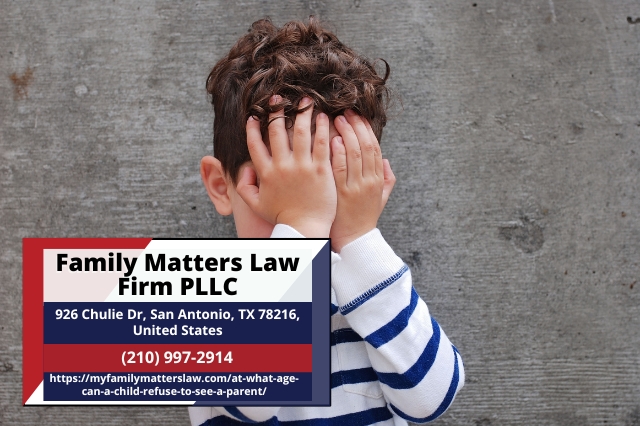San Antonio child custody and visitation lawyer Linda Leeser (https://myfamilymatterslaw.com/at-what-age-can-a-child-refuse-to-see-a-parent/) of Family Matters Law Firm PLLC has provided valuable insight into an important question many parents face “At what age can a child refuse to see a parent?”, Texas law requires both parents to comply with court-ordered visitation schedules, ensuring that children maintain relationships with both parents. However, children may express their preferences, which courts consider alongside other factors such as age, maturity, and reasoning. Despite this, a child cannot unilaterally decide to stop visitation until they turn 18 unless a judge modifies the order.
San Antonio child custody and visitation lawyer Linda Leeser highlights that courts emphasize the importance of maintaining visitation agreements unless valid legal reasons, such as abuse or neglect, justify changes. If a child refuses to see a parent, the custodial parent must continue encouraging and facilitating visits. Failing to comply with court orders may result in legal consequences, including being held in contempt of court. Leeser stresses that parents facing these challenges should take appropriate legal steps rather than unilaterally changing visitation terms.
According to San Antonio child custody and visitation lawyer Linda Leeser, Texas law does not specify an age at which a child can refuse visitation. The court retains full discretion in these matters, assessing each case individually. While a judge may consider the wishes of a child 12 years or older through a private interview, the final decision remains with the court. The best interest of the child standard guides these decisions, taking into account emotional and physical well-being, parental involvement, and the stability of each parent’s home.
Texas courts generally issue a Standard Possession Order (SPO) to establish structured visitation schedules. This arrangement grants the noncustodial parent visitation rights on specific weekends, holidays, and during summer months. If a child refuses to follow the SPO, it does not automatically nullify the order. Instead, parents are expected to handle the situation through open communication, mediation, or legal modifications if necessary. Courts do not support unilateral decisions to prevent or alter visitation without valid legal grounds.
Common reasons a child may resist visitation include adjustment difficulties after divorce, emotional or psychological concerns, parental influence, or fear of an unsafe environment. Leeser explains that children may struggle with separation anxiety, especially when adjusting to a new routine. Older children may find it challenging to balance school and extracurricular activities with a structured visitation schedule. In some cases, a custodial parent’s negative remarks about the other parent can contribute to resistance. Courts carefully evaluate these factors when considering visitation disputes.
Fear of abuse, neglect, or unsafe living conditions is another factor that may cause a child to refuse visitation. If concerns about a child’s safety arise, legal steps must be taken to modify the visitation arrangement. Courts prioritize the child’s well-being and may order supervised visitation if necessary. In these cases, parents should seek legal intervention rather than attempting to resolve the issue on their own.
Legal consequences exist for parents who fail to enforce visitation. A custodial parent who does not encourage or facilitate court-ordered visitation can face contempt of court charges. This may result in fines, make-up visitation orders, or even jail time in severe cases. Additionally, if one parent repeatedly interferes with visitation, the noncustodial parent may seek a modification of custody arrangements. Courts may determine that persistent interference is not in the child’s best interests, potentially altering custody rights.
Linda Leeser advises parents dealing with visitation challenges to document all interactions regarding missed visits. Proper records include maintaining a log of missed visits, keeping copies of court orders, and documenting all efforts to encourage compliance. Using written communication such as emails or text messages can help parents demonstrate their attempts to follow court orders. Witness testimony from teachers, counselors, or family members may also serve as evidence in legal proceedings.
Mediation and family counseling can be effective tools for resolving visitation conflicts. When a child refuses to see a parent, a neutral third party may assist in facilitating a resolution. Family counseling can help address emotional distress or strained relationships contributing to visitation resistance. In some cases, courts may order therapeutic interventions, such as counseling for the child or co-parenting classes. If necessary, a court-appointed guardian or mental health professional may evaluate the child’s situation and provide recommendations.
Resolving visitation disputes requires understanding legal obligations and taking appropriate action. Handling these issues properly prevents legal complications and ensures that parental rights remain protected. Linda Leeser emphasizes the importance of working within the legal system to find solutions that prioritize the well-being of the child while maintaining compliance with Texas custody laws.
Family Matters Law Firm PLLC is dedicated to assisting parents facing custody and visitation challenges. Seeking legal guidance from an experienced attorney can help parents navigate court procedures, enforce visitation rights, and protect their relationship with their child. Those dealing with visitation issues should explore legal options to ensure compliance with custody arrangements while promoting the best interests of their child.
About Family Matters Law Firm PLLC:
Family Matters Law Firm PLLC provides legal services for child custody and visitation cases in Texas. The firm is committed to helping parents navigate custody disputes while prioritizing the best interests of the child.
Embeds:
Youtube Video: https://www.youtube.com/watch?v=cR_jC5DbgsE
GMB: https://www.google.com/maps?cid=1486853059394308163
Email and website
Email: schedule@attytx.com
Website: https://myfamilymatterslaw.com/
Media Contact
Company Name: Family Matters Law Firm PLLC
Contact Person: Linda Leeser
Email: Send Email
Phone: (210) 997-2914
Address:926 Chulie Dr
City: San Antonio
State: Texas 78216
Country: United States
Website: https://myfamilymatterslaw.com/

